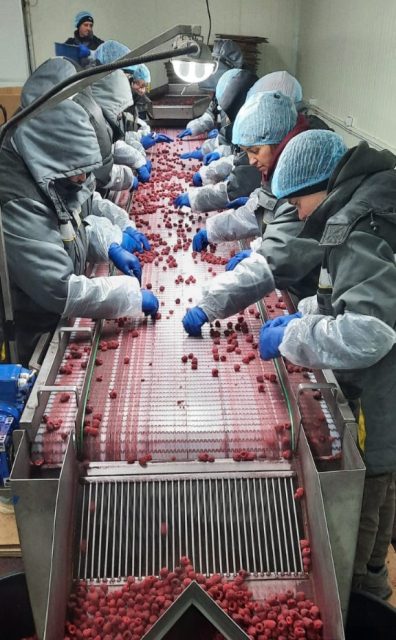Despite the ongoing war, Ukraine has been steadily boosting its fruit exports and has emerged as a dominant force in the frozen raspberry market abroad. In the latest season, Ukraine has secured a spot among the top five suppliers to the American market, outshining all non-American competitors except Serbia.
“Serbs lead Europe in raspberry cultivation, followed by Poles, with Ukrainians now holding third place. We only made it into this ranking last year, moving up from fifth. However, there’s an interesting twist: Ukrainian raspberries also show up in Poland’s official statistics. According to my sources, the Poles are marketing our berries as their own and making extra profits from this re-exportation,” explains Taras Andriychuk, president of the Faina Polyana Cooperative, in an interview with The Ukrainian Week. For major European economies like Germany, Belgium, and France, buying berries from a European country such as Poland is undoubtedly more reassuring. If Ukraine were able to export directly to these markets, it would likely surpass Poland in the rankings. According to Andriy Yarmak, an economist at the FAO’s Investment Department, Poland makes approximately $100 million (£77,385,000) solely from repackaging Ukrainian berries.
“This situation serves as a stark lesson for Ukraine,” says Yarmak. “Traditionally, Ukraine has been satisfied with selling raspberries at the lowest prices to Poland, where a substantial share of the added value is captured. With even a modest investment in marketing, Ukraine could potentially export its raspberries at nearly double the current price.”
When Ukraine joins the European Union, countries like Poland will likely seek to impose restrictions on the products we can cultivate and export to international markets. According to farmer Taras Andriychuk, this is a common practice across the European market. In contrast, raspberries remain Serbia’s top export, and harvesting berries in Poland is significantly more costly compared to Ukraine.
Established in 2015, the Faina Polyana Cooperative operates across ten localities in Ternopil and partially in Ivano-Frankivsk regions. By 2023, the cooperative had grown to 62 members, each owning their own land—an uncommon but significant feature of this cooperative.
Harvesting raspberries presents a significant challenge, particularly when it comes to mechanisation. In Ukraine, the climate is not conducive to growing raspberry varieties that are suitable for machine harvesting. Consequently, each farmer adapts as best they can. “Some involve their families, while others manage large plots—such as 4 hectares of raspberries—with half the village pitching in during the harvest season,” explains the farmer. “At the same time, we don’t lease land, nor do we operate a communal field or a Soviet-style collective farm. Each farmer has the freedom to set their own working methods. The cooperative steps in to support by purchasing plants and protective products in bulk—making it more affordable—and also helps with sales and exports,” he explains.

Since 2018, the cooperative has been pouring investment into facilities designed for sorting, packaging, freezing, and efficiently selling the berries. They’ve built a grading room that can handle 20 workers at once and added a blast freezer that processes up to 10 tonnes of berries daily. Additionally, they’ve installed a storage system with a capacity for 210 tonnes of produce.
“Now, we can package and sell raspberries beyond the day of harvest, which wasn’t possible at the start. It’s a demanding task: the berries begin to deteriorate within hours, so we need to pick them every two days for three and a half months, come rain or shine. Once harvested, we deliver them to major agricultural processors, often waiting in line until six in the morning. Prices can be unpredictable and may drop during the season, adding to the challenge.”
“Initially, we sold our frozen raspberries through intermediaries, meaning they were the ones profiting, not us. However, in 2022, we took a significant step forward by exporting a third of our reprocessed products directly, mainly to Poland. By 2023, we had increased this figure to over 90% of our harvest. While this shift requires us to adhere to various standards and regulations, we’re continuously improving,” the farmers explain.
The Faina Poliana Cooperative is broadening its production horizons. “We’re now packaging wild pine cones, and last year we worked with elderflowers. We’re also planting sea buckthorn, and some members are growing garden strawberries, though these are sold fresh rather than frozen. We’re up against strong competition from Egypt and Morocco, which offer frozen products at very low prices,” says Taras Andriychuk.
This year, the new harvest of frozen raspberries has already hit the EU market, with prices starting at €3.20 per kilogram. However, these prices are expected to climb further. Factors contributing to this include decreased production in Serbia and the unusually high temperatures affecting Ukraine’s key raspberry-growing regions. On top of that, the persistent Russian attacks on Ukrainian infrastructure are causing power outages that disrupt production schedules. Unlike their competitors, who can afford to wait, Ukrainian producers are under pressure to sell their frozen berries as swiftly as possible.

